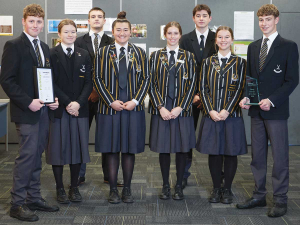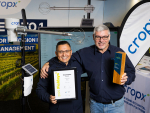St Paul's Collegiate School in Hamilton has come up trumps again at the recent Fieldays Online Innovation Awards.
Both the lads and lasses had entries in the Young Inventor of the Year Award, with the boys coming out on top with their Flash Flow device that gives a visual check of water flow or identification of possible leaks.
The team of Curtly Harper, Thomas Glenn, William Cowan and James Barker are all farmers’ sons, so are familiar with ensuring a consistent flow of water to livestock. The Flash Flow unit consists of a heavy-duty plastic housing that is installed in a water line. Internally, an impellor is spun by the flow of water, which in turn generates an electric current that powers a light that is mounted on a standard or fence line.
Housed underground, the $40 unit is protected from livestock, and is made from high-density plastics, making it durable and maintenance-free. The unit is assembled in New Zealand and is currently undergoing final testing, although eventual production has been delayed by the Covid-19 pandemic.
Meanwhile, the female camp of Molly Nelson, Ellis Watson, Libby Deadman and Lucy Fullerton-Smith took out the runner-up prize in the same competition, with their Ewe-nique animal recognition system.
Based on the use
of an app on a smart device or a connected camera, sheep are identified as they pass along a race or over a weighing scale. Using technology that has been developed by Iris Data Systems, the App allows users to see real-time information.
This means a sheep’s identity, and other key information, can be collected in a centralised location, without relying on the need to scan an ear tag that – in some cases – might be missing.
Expected to cost around $1.40 per animal per annum, the unit is currently undergoing final verifying before its release.
Agribusiness at St Paul's
Committed to taking the lead to meet primary industry needs, St Paul’s Collegiate developed a two-year agribusiness programme in 2014.
The aim was to champion a subject that stimulates careers in agricultural science and business – as well as encouraging young people to proactively select career pathways in the sector – by exposing students to the wide range of skills required and opportunities available.
Currently 107 students across levels 2 and 3 at St Paul’s are completing the agribusiness programme.
Working alongside the Ministry of Education, the school developed the new subject and wrote seven Achievement Standards for the NCEA Framework. The programme is designed to deliver a curriculum that meets the agricultural industry’s long-term needs to develop highly skilled and motivated young people, which are necessary for the agriculture sector’s sustainability.
Additionally, the programme also highlights to urban students the potential for well-paid, stimulating careers in the primary sector, while also helping to improve the public’s perception of primary industry careers.
St Paul’s programme has been so successful it has now been rolled out to around 20% of New Zealand’s secondary schools. This saw some 2239 students study agribusiness at levels 2 or 3 around the country in 2019.
Funding for the programme was provided by the primary industries as a public-private partnership. DairyNZ and Beef+Lamb NZ were key funders, alongside a number of other businesses from across the sector’s supply chains, including: AGMARDT, AGrowQuip, BNZ, Campbell Tyson, Gallagher, Greenlea Meats, New Zealand Meat Industry Association, National Fieldays Society, Tetra Pak, Waikato Milking Systems, Waitomo Petroleum, Fairview and Zoetis.











